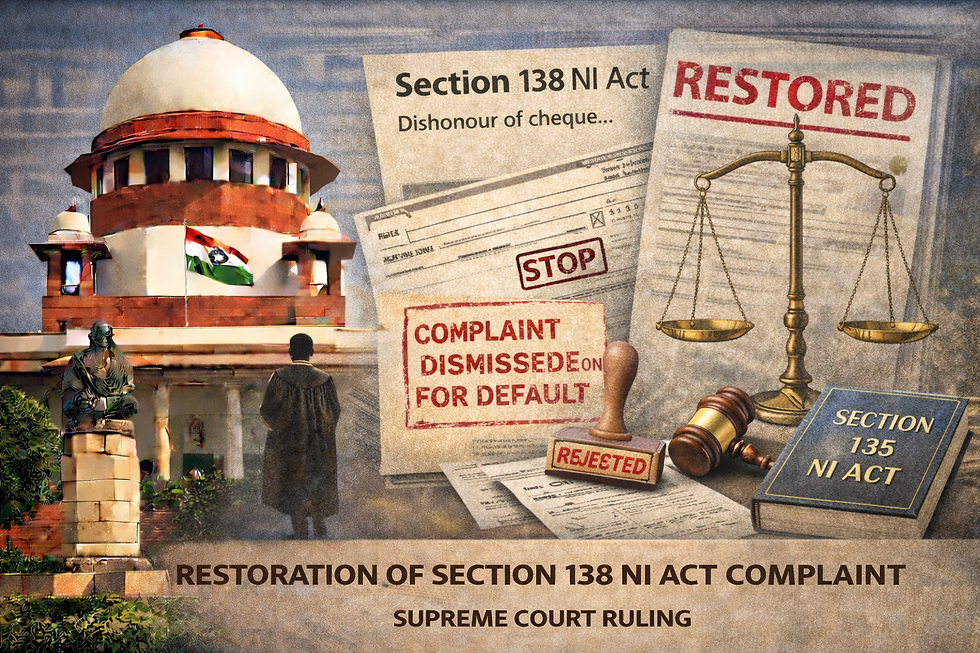Equity Cannot Confer Benefit Without Legal Basis: Supreme Court Clarifies Compassionate Appointment Rules
- Chintan Shah

- Nov 14, 2024
- 3 min read
Summary of the Judgment
Case Name: Tinku v. State of Haryana & Others
Date: 13 November 2024
Judges: Honorable Justices Abhay S. Oka, Ahsanuddin Amanullah, and Augustine George Masih
Advocates: Counsel representing the appellant and respondents
Acts and Sections:
Haryana Compassionate Assistance to the Dependents of Deceased Government Employees Rules, 2006;
Article 14 of the Constitution of India
Cited Judgements:
Umesh Kumar Nagpal v. State of Haryana (1994)
Shanti Sports Club v. Union of India (2009)
Chandigarh Administration v. Jagjit Singh (1995)
R Muthukumar v. TANGEDCO (2022)
Basawaraj v. Special Land Acquisition Officer (2013)
Introduction
The Supreme Court of India’s judgment in Tinku v. State of Haryana addresses the sensitive issue of compassionate appointments, examining the scope of relief granted to dependents of deceased government employees. This case revolves around Tinku, son of a deceased Haryana Police constable, who sought compassionate appointment as per the ex-gratia policy active at the time of his father's passing. The Honorable Bench, led by Justice Augustine George Masih, highlights key legal principles governing compassionate appointments, including equality under Article 14 and the intent behind compassionate appointment policies.
Background and Facts of the Case
The appellant's father, a constable with Haryana Police, died on duty in 1997. At the time, Tinku was a minor, only seven years old. His mother, unable to secure a position for herself due to illiteracy, applied for Tinku’s future employment under the compassionate scheme. His name was entered into the Minor’s Register, with instructions that he could claim employment upon reaching majority. However, upon turning 18 in 2008, Tinku’s application was denied on grounds of delay, as 11 years had passed since his father's death, invoking the 1999 policy limiting claims to within three years of the dependent reaching majority.
Legal Arguments and Key Issues
The primary legal issue involved the validity of the rejection based on time limitations. Tinku’s counsel argued that his case was unjustly dismissed under the principle of promissory estoppel, as earlier communications from the Haryana Police indicated that his claim would be considered upon attaining majority. Furthermore, Tinku's counsel contended that similarly situated applicants had been granted compassionate appointments, and that he should receive equal consideration under Article 14.
Promissory Estoppel and Equal Treatment
The Bench reviewed the principle of promissory estoppel, observing that while the policy at the time of the father's death allowed for compassionate appointments, subsequent policy changes added time limitations. The court noted, “An appointment under compassionate grounds is an exception to the general rule and must be aligned with legal backing.” Justice Masih emphasised that mere entry into the Minor’s Register did not guarantee employment and held that promissory estoppel could not override policy amendments restricting claims.
The Court further clarified the limits of Article 14, stating, “No direction can be issued mandating the State to perpetuate any illegality or irregularity in favour of any person.” Thus, equal treatment does not entitle every claimant to a compassionate appointment without adherence to policy, even if similar cases received approval before policy revisions.
Compassionate Appointment as a Relief, Not a Right
The Court reaffirmed that compassionate appointments serve as a relief mechanism, not a vested right, designed to assist families in dire financial straits. The Bench remarked, “Compassionate appointment is intended to bail out a family of a deceased employee facing extreme financial difficulty.” This provision exists to alleviate immediate distress, not to confer entitlement.
Tinku’s claim, the Court concluded, failed to meet the policy’s urgency criteria, as the 11-year delay from his father’s death did not align with the policy’s intent to provide swift relief to families in financial crises.
Rationale for Ex-Gratia Compensation
While rejecting Tinku's claim, the Court acknowledged the appellant’s prolonged wait due to administrative processes. Justice Masih pointed to procedural delays and directed that Tinku’s mother, as the widow of the deceased employee, should be permitted to apply for a one-time ex-gratia compensation, remarking, “Equity demands that the State act fairly in handling applications under compassionate schemes.” The Court ordered a six-week deadline for this application to be processed, adding an interest clause to prevent further delays.
Conclusion
This judgment reiterates the fundamental purpose of compassionate appointments, underscoring that policies aim to provide timely assistance rather than long-term assurances. Through this decision, the Supreme Court sets a precedent that compassionate appointments must align with statutory policies, offering relief only to families in immediate distress. Justice Masih’s words serve as a reminder of the balance between equitable relief and policy constraints: “Equity cannot be extended to confer a benefit or advantage without legal basis.”



Comments